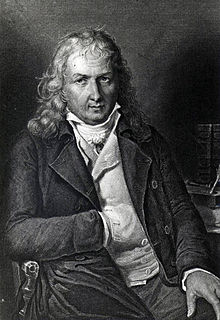A Quote by African Spir
The distinction between right and wrong ("la distinction du bien et du mal", Fr.), is nothing else than their unyielding (or implacable) opposition; thus the moral consciousness is an innate and intimate revelation of the absolute, which goes beyond (or goes pass, or exceed) every empirical data (or given information). It is only on these principles that we will be able to establish ("pourront être édifiées", Fr.) the real basis of morality.
Related Quotes
Religion is not simply a theory, it is a higher life, of which morality is an integral part - a life devoted to the worship of the good and the true, for God, the absolute, is the supreme source of all perfection" ("La religion n'et pas une smple théorie, elle est une vie supérieure, dont la moralité fait partie intégrante - une vie vouée au culte du bien et du vrai, car Dieu, l'absolu est la source de toute perfection", Fr.)
It goes without saying that only inner greatness possess a true value ("une valeur véritable,", Fr.) . Any attempt to rise up (or at rising up, - "s'élever", Fr.) outwardly above others, or to want (or wish) to impose one's superiority, denote a lack of moral greatness, since we do not try to replace ("suppléer", Fr.) in that way (.... in French "par là", Fr.) to what, if we did really possess it, would have no need whatsoever to flaunt itself.
Besides the progress of industry and technique, we see a growing discontent among the masses; we see, besides the expansion ("expansion,", Fr.) of instruction, distrust and hatred expanding among nations ("s'étendre la méfiance et la haine entre," Fr.), that vie with one another ("qui rivalisent à l'envi," Fr.), by the increase of their armies and the improvement of their engines of murder ("engins meurtriers", Fr).
Men who have sacrifice their well-being, and even their lives, for the cause of truth or the public good, are, from an empirical point of view - which scorn ("fait fi", Fr.) virtue and altruism - regarded as insane or fools; but, from a moral standpoint, they are heros who do honour ("qui honorent", Fr.) humanity.
As the antagonism between those who possess, and those who do not, is becoming more acute day after day, we can already foresee a moment when it will bring about ("entraînera", Fr.) severe (big, high, intense, - "grands", Fr.) disasters, if we do turn (direct, aim, - "dirige", Fr.) life in time the social life in new directions (or ways, - "dans des voies nouvelles", Fr.)
If there is no absolute moral standard, then one cannot say in a final sense that anything is right or wrong. By absolute we mean that which always applies, that which provides a final or ultimate standard. There must be an absolute if there are to be morals, and there must be an absolute if there are to be real values. If there is no absolute beyond man's ideas, then there is no final appeal to judge between individuals and groups whose moral judgments conflict. We are merely left with conflicting opinions.
The need for sociability induce man to be in touch with his fellow men. However, this need might not ("ne saurait", Fr.) find its full (or complete) satisfaction in the conventional (or superficial, - "conventionnel", Fr.) and deceitful world, in which (or where) everyone is mainly (or mostly) trying to assert oneself in front of others ("devant les autres", Fr.), to appear, and hoping to find in society ("mondaine", Fr.) relationships some advantages for his interest and vanity (or vainglory or conceit", Fr).
Infringing upon (or encroaching) the right of a single person, we overthrow (or turn upside down) the whole order on which rest legal agreements; for if we break (or transgress or violate) the undertakings enter unto ("les engagements contractés", Fr.), nothing assure that we will not break them, possibly ("éventuellement", Fr.) in another.
See that unfortunate soldier who is falling hurt to death ("tombe blessé à...", Fr.) on the battlefield; he learns that his folks have vanquished and dies happy. He detached himself from himself (s'est détacher de lui-même", Fr.), has identified himself with something greater and more lasting than himself; his homeland ("patrie", Fr.); thus, while dying as an individual, he has the certainty to survive in a larger existence.
We are ... led to a somewhat vague distinction between what we may call "hard" data and "soft" data. This distinction is a matter of degree, and must not be pressed; but if not taken too seriously it may help to make the situation clear. I mean by "hard" data those which resist the solvent influence of critical reflection, and by "soft" data those which, under the operation of this process, become to our minds more or less doubtful.































